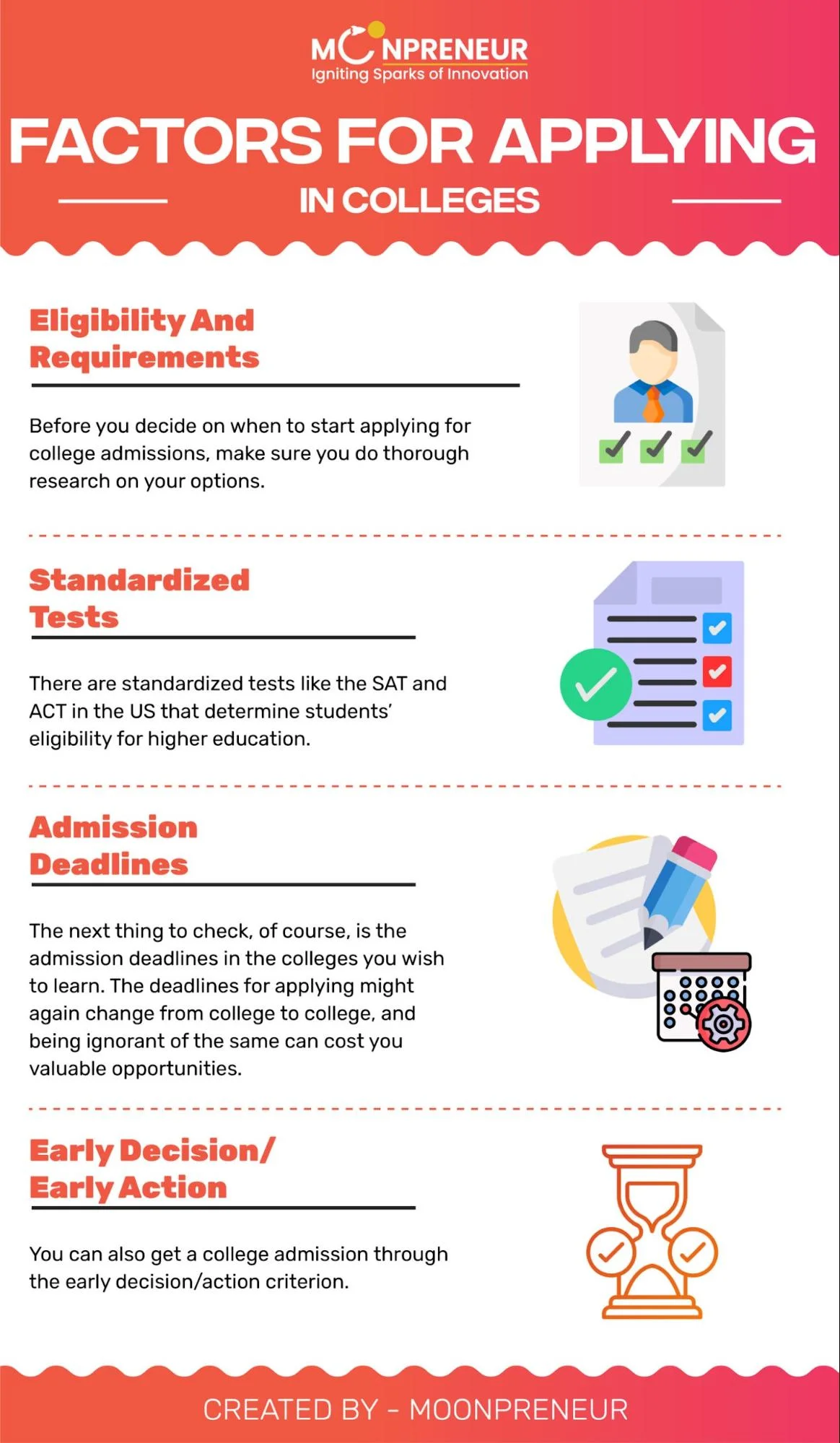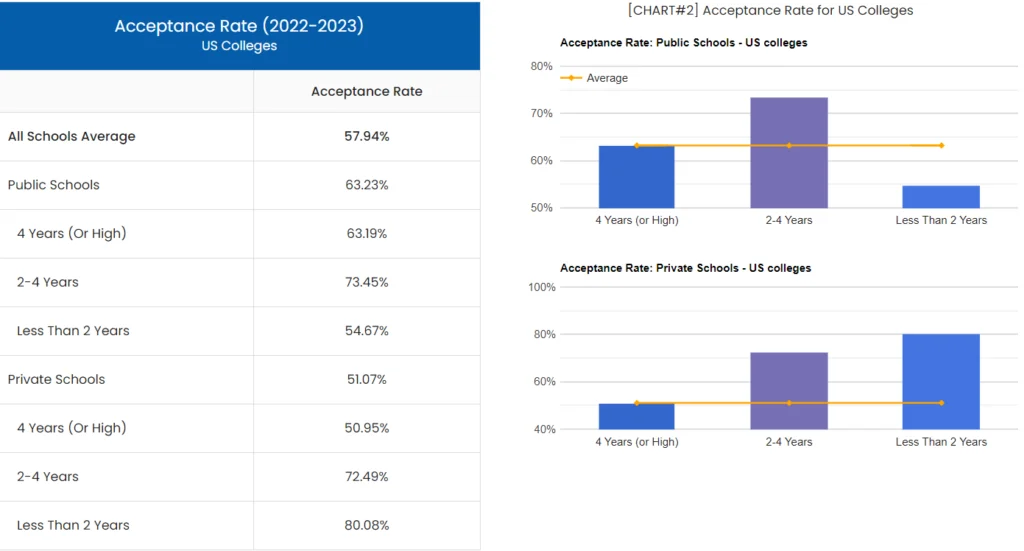
As we near the end of high school, the prospect of attending college elicits a wide range of emotions in us. It fills us with joy and thrills, but it also instills responsibility that comes with growing up, academic pressure, and so on.
One of the responsibilities is to complete time-consuming and extensive college admissions procedures.
Students frequently ask when is the best time to start applying to universities.
If you want to pursue your passions through college, you should make a decision as early as feasible. To make things easier for you, we’ve created this helpful blog that may serve as your guide and mentor.
What is the right time to apply to colleges and universities?
The majority of universities provide you with options for when to submit your application. The numerous options are referred to as admissions plans, and each plan has its own set of deadlines, specifications, and, on occasion, constraints.
As you research colleges, you’ll come across admissions programs such as early decision, early action, regular decision, and rolling admissions.
Some institutions allow students to submit applications earlier than their normal deadline, so getting an early start will benefit you. For instance, it reduces the amount of work you’ll have to complete for the rest of high school, which is beneficial for those who know their goals.
By applying earlier, you’ll receive a response sooner, allowing you enough time to evaluate your options and make a final decision.
The Timeline For College Applications In The United States
The timeline mentioned below is useful for understanding how the application and admission process is broken down into periods of research and planning.
1. High School Junior Year
Once you are in your junior year in high school, you can start a well-planned preparation for your college education. Indulge in research and gather information from seniors, teachers, family members, and other acquaintances to get a better grasp on what college to choose. You can find many online sources to help you make the best choice. Also, attend college fairs with friends, visit different campuses to get a detailed idea, and make the best of your time preparing for standardized tests if you plan on taking one.
2. Summer Holiday After Junior Year
Most colleges demand application requirements like essays, letters of recommendation, etc. So, the summer holidays just before senior year is the best time to get these ready. Since you are free from study schedules, you can work on the essays or gather recommendations from teachers or counselors to secure your college admission. This time can also be utilized to further your understanding of the college you wish to attend by visiting the campus or talking to someone who already goes there.
3. Senior Year Fall Semester
It is during the fall of the senior year that most colleges start their application process. So, keep your eyes and ears open for application information, and be meticulous while checking deadlines. Most colleges have application deadlines between November and January. Apply way before the end date so you are not caught in a last-minute hustle that sometimes costs you a priceless opportunity.
4. Senior Year Winter
If you wish to secure an early admission through the early decision/action criterion, this is the time to act. The deadline for applying through this medium is generally in November or December. However, the early decision is a binding deal which means you commit to attending the particular college in case you are admitted.
On the other hand, early action is a non-binding deal where you have the chance to apply for more than one college at the same time.
5. Senior Year Spring Semester
It is during the spring semester of your senior year that you will begin to receive responses for your college applications. This means apart from being optimistic about getting admitted to a good college; you should also be ready for the subsequent procedures upon a positive response. These include financial arrangements, document submissions, looking for aid options, and more.
Tips for Choosing the Right College

1. Determine Your Priorities
It is usually preferable to be one hundred percent sure about your priorities because this helps in making the right decision at the right time. For instance, decide which elements are most significant to you – school, school size, available majors, extracurricular activities, diversity, location, fee, financial aids, etc.
2. Think About Your Academic Objective
Make sure the college has the majors or programs that suit your academic preferences and professional aspirations. Find out the faculty’s level of competence in your selected subject.


3. Location, Location, Location
Consider where you wish to reside for the foreseeable future. Do you prefer the city, the suburbs, or the country? Think about things like the weather, your distance from home, and amenities.
4. Financial Considerations
Assess the costs such as tuition fees, accommodation, etc. Look into the financial help, grants, and scholarships that are offered.


5. Explore the Campus
Schedule a trip to the campus if possible. This offers the chance to explore the facilities, meet existing students, and get a sense of the neighborhood. Deciding based on research-based information is always advantageous.
6. Extra Scholastic Activities
Investigate the on-campus groups, associations, and extracurricular activities. Think about how they fit with your interests and objectives outside of the classroom.


7. Class sizes and the ratio of students to faculty
Organize your learning preferences. Do you favor lengthy lectures over smaller, more intimate classrooms? Individualized attention may result from a low student-to-faculty ratio.
8. Alumni Network and Career Services
Research on the services that are offered for job placement, internships, and career resources. A robust alumni network might offer beneficial contacts and chances.


9.Reputation & Accreditation
Check to see if the college has received accreditation from a reputable organization. Look at the reputation of both the institution as a whole and of individual programs.
10. Listen to Your Gut Feeling
Embrace your gut feeling. As you enter the campus and engage with the instructors and students, pay attention to how you feel. It’s crucial to feel at ease and home.


Acceptance Rate
Acceptance rates are dream breakers. Therefore, it is a must for students to do thorough research on the acceptance rate of their college of choice and then aim for that college.
Statistics indicate that the average acceptance rate in US colleges this year is around 57%. If you are someone in high school who wants to know what the

right time is to explore the best colleges for higher education and when would be the ideal time to start applying, this blog might be of use to you.
Source: unit stats
Factors To Consider While Starting College Applications
Here are some crucial factors to keep in mind that would help you decide exactly when to start with college applications:
1. Eligibility And Requirements
Before applying for college admissions, research your options. Check on the eligibility criteria and other requirements of the colleges. These might differ from college to college, so you should not make errors in proper research.
2. Standardized Tests
There are standardized tests like the SAT and ACT that determine students’ eligibility for higher education. If you wish to attempt these tests, it is important to check the exam details and schedules beforehand and start your preparation early. Apart from preparing early, registering early for these exams gives you the flexibility to make a suitable course of action.
Many institutions have made standardized assessments optional since COVID-19, so you should look into that as well.
3. Admission Deadlines In Colleges
The next thing to check, of course, is the admission deadlines in the colleges you wish to learn. The deadlines vary from college to college, and being ignorant of the same can cost you valuable opportunities.
Some colleges even have a rolling admissions process, which means they review applications instantly, and the seats get filled up fast.
4. Early Decision/Early Action Criterion
You can also get a college admission through the early decision/action criterion. Students usually have to apply during the winter of their senior year for this, and you can secure a seat through this early admission process. But seeking admission through this means that you have to start your college browsing and research earlier.
Conclusion
Applying for colleges is a crucial step for each student, and it should be done at the right time to ensure a hassle-free process. It is important to consider the abovementioned factors while following the timeline and making appropriate decisions. Good luck!
Moonpreneur provides college admission assistance and accelerates children’s college admissions process by helping them create unique passion projects. For more details, you can book a free counseling session by clicking here https://moonpreneur.com/college-admission-process/
Moonpreneur is dedicated to transforming conventional education, preparing the next generation with comprehensive learning experiences. Our Innovator Program equips students with vital skills in AI/ML, Robotics, Coding, Game Development, and App Development, fostering entrepreneurship through hands-on learning. This initiative aims to cultivate the workforce of tomorrow by integrating innovative technologies and practical skills in school curriculums.
Register for a 60-minute free workshop today!
Update: This article was last updated on 6th November 2023 to reflect the accuracy and up-to-date information on the page.
















When should I begin my application process for the fall of 2024?
For the majority of students enrolling in the fall of 2024, the application process began on the 1st of August, 2023, with the most frequent deadlines for college admissions being November and February respectively. Early admission refers to the commencement of the application process prior to the end of the senior year.
How do fall semester and spring semesters work in the United States?
The spring semester typically covers the period from January to May. Admissions for the second round of admission are currently in progress. The most common intake period is the fall semester, typically spanning the months of September to December.
If I start during the January/Spring intake instead of the fall intake, will I not be able to access any academic material?
However, there’s no guarantee that you’ll miss out on any academic material if you sign up for the January intake or spring intake. Many universities offer similar course sequences so you can complete your degree on time.